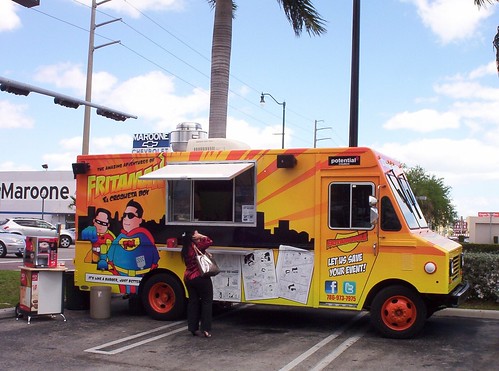From the Cart to Cuisine: Your 5 Step Guide to Starting a Mobile Food Truck
Starting a mobile food truckbusiness doesn’t start and end with purchasing the truck. Before you build your food truck empire, you need to follow a few basic steps that’ll get you started down the path to success. Here’s your step by step guide:
1. Develop a Unique Idea

Image via Flickr by Phillip Pessar
Before you even explore whether you can raise the funds needed to start a food truck business, you need to develop a unique idea that stands out from others in your area.
This unique idea includes more than just recipes that customers will love. You’ll also want:
- A catchy name that identifies something special about your business
- An appealing logo
- A PR model that’ll bring people to your truck on the first day
2. Get a Truck That Matches Your Needs
A reliable food truck will probably cost you at least $60,000. That’s a significant portion of your capital. Make sure you get a truck that works well and has the right design for your kitchen.
Russell Concession & Mobile Kitchens, Inc. has a variety of options to meet the needs of all food truck owners. In addition to fully functional food trucks, they sell trailers designed specifically for grilling, smoking, and catering.
3. Apply for Your Permits
Every city has its own laws regulating food trucks. Many cities have adopted friendly laws that make it easier for food trucks to serve their customers. But there are still plenty of cities with complex rules that could make it difficult for you to get started.
One thing is certain: you will need permits to operate your mobile restaurant. Contact your city’s permit office to learn more about local requirements. Remember, other cities might require different permits. Make sure you’re approved to work where your customers are.
4. Get Insurance for Your Vehicle, Business, and Employees
You will need several types of insurance to operate your new business. Some of the most important policies include:
- Vehicle insurance (about $2,500 a year)
- General liability insurance (about $3,500)
- Workers’ compensation insurance (about $7,00 for three employees)
If you don’t get the right insurance policies, you are begging for a city or state department to shut you down.
5. Find a Great Spot
Mobile food trucks rely on good locations just as much as brick and mortar restaurants. The big difference is that you’re looking for a parking spot, not a piece of real estate.
In some cities, you might wish you could just rent a building and get on with business. Unfortunately, you have to contend with a litany of parking regulations that tell you where you can and cannot operate.
If you want to park at a private lot, then you’ll need permission from the owner. If you want to park on the street, then you need to follow the city’s laws. Many cities assign parking spots for food vendors. It’s different everywhere you go, so know what you’re facing before you invest.
What issues do you anticipate when starting your food truck, and how will you overcome these challenges? Share your thoughts in the comments below.
